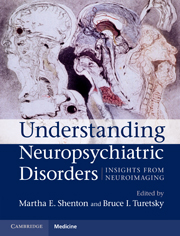Book contents
- Frontmatter
- Contents
- List of contributors
- Preface
- Section I Schizophrenia
- Section II Mood Disorders
- Section III Anxiety Disorders
- 13 Structural imaging of post-traumatic stress disorder
- 14 Functional imaging of post-traumatic stress disorder
- 15 Molecular imaging of post-traumatic stress disorder
- 16 Structural imaging of obsessive–compulsive disorder
- 17 Functional imaging of obsessive–compulsive disorder
- 18 Molecular imaging of obsessive–compulsive disorder
- 19 Structural imaging of other anxiety disorders
- 20 Functional imaging of other anxiety disorders
- 21 Molecular imaging of other anxiety disorders
- 22 Neuroimaging of anxiety disorders: commentary
- Section IV Cognitive Disorders
- Section V Substance Abuse
- Section VI Eating Disorders
- Section VII Developmental Disorders
- Index
- References
14 - Functional imaging of post-traumatic stress disorder
from Section III - Anxiety Disorders
Published online by Cambridge University Press: 10 January 2011
- Frontmatter
- Contents
- List of contributors
- Preface
- Section I Schizophrenia
- Section II Mood Disorders
- Section III Anxiety Disorders
- 13 Structural imaging of post-traumatic stress disorder
- 14 Functional imaging of post-traumatic stress disorder
- 15 Molecular imaging of post-traumatic stress disorder
- 16 Structural imaging of obsessive–compulsive disorder
- 17 Functional imaging of obsessive–compulsive disorder
- 18 Molecular imaging of obsessive–compulsive disorder
- 19 Structural imaging of other anxiety disorders
- 20 Functional imaging of other anxiety disorders
- 21 Molecular imaging of other anxiety disorders
- 22 Neuroimaging of anxiety disorders: commentary
- Section IV Cognitive Disorders
- Section V Substance Abuse
- Section VI Eating Disorders
- Section VII Developmental Disorders
- Index
- References
Summary
Introduction
Post-traumatic stress disorder (PTSD) is an anxiety disorder that can develop in individuals who (1) are exposed to an event or events that involve the threat of death or serious injury, and (2) react with intense fear, helplessness or horror (APA,2000). Individuals with PTSD re-experience the traumatic event in various ways, including nightmares, intrusive recollections, and flashbacks. In addition, patients may attempt to avoid thoughts or reminders of the trauma and may experience a restricted range of affect, especially positive affect. Finally, patients with PTSD report hyperarousal symptoms, such as hypervigilance, exaggerated startle, and difficulty concentrating (APA, 2000).
In this chapter, we will summarize a neurocircuitry model of PTSD and briefly describe the techniques that have been used to study brain function in this disorder. We will then review the findings of relevant functional neuroimaging studies. Given that current neurocircuitry models focus on the amygdala, medial prefrontal cortex, and hippocampus, this review will include studies that have reported significant findings in those brain regions. (For other recent reviews, see Francati et al., 2007; Lanius et al., 2006; Rauch et al., 2006.) Lastly, we will summarize the findings and suggest directions for future research.
Keywords
- Type
- Chapter
- Information
- Understanding Neuropsychiatric DisordersInsights from Neuroimaging, pp. 214 - 228Publisher: Cambridge University PressPrint publication year: 2010

